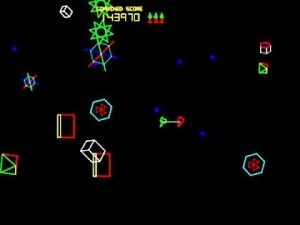

Welcome to Vector Alchemy!
I fell in love with vector games back in 1979 when I first encountered an Asteroids machine at age 11, and I’m still a huge fan of their minimalist art style and pure game mechanics.

I created Vector Alchemy and the Flynn Javascript vector framework to bring my love of vector magic to the browser, share it with my friends, and fill the world with more great vector games.

Back in the day, video games contained displays which were basically televisions. They displayed their images at low resolutions using “raster” technology. An electron beam painted the screen one horizontal line at a time, progressing from top to bottom in endless repetition. Because memory was expensive and processor speeds were slow, the pixel resolution of those early displays was very limited, and their raster graphics ended up being very blocky.

A crop of games emerged at that time using an alternative “vector” technology. Instead of making images out of square pixels, those machines commanded the electron beam directly, causing it to draw very smooth, straight, and thin lines between two end points, without the jagged edges associated with raster images. (It’s worth noting that Tennis for Two (1958) and MIT’s Spacewar! (1962) were arguably the first “arcade games” ever created, and both used vector displays.)

Over time improvements in display resolutions, memory cost, and processor speed drove the industry to use raster displays exclusively. Only about 33 different vector arcade machines were ever commercially released.

The artistic style of the vector genre emerged from the constraints of the display technology it used; thin lines, dot projectiles, line-drawn fonts, transparent object interiors, an absence of curves, and a limited color palette (the earliest games were monochrome, mid-generation games used translucent color overlays, and late-generation games could render 6 colors plus white).
Vector Alchemy games bring the artistic style of those old classics to the modern web, while playfully bending some of the old rules.
All the games run on laptops / desktops. Most will run on mobile devices, but occasionally a game requires more buttons than a touch interface can reasonably accommodate.